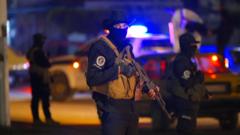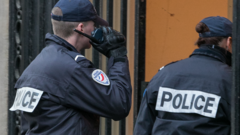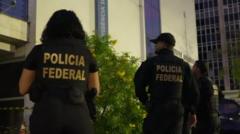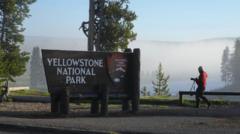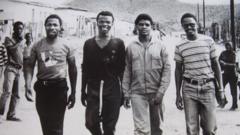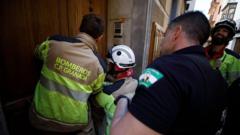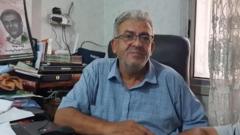Teuchitlán's Mayor José Murguía Santiago faces serious allegations regarding links to cartel activities after disturbing findings at a nearby ranch highlight ongoing issues of violence and missing persons in Mexico.
**Mexican Mayor Detained Amid Cartel Training Camp Scandal**

**Mexican Mayor Detained Amid Cartel Training Camp Scandal**
Investigation reveals connections between local officials and drug-trafficking organizations in Jalisco.
In a significant turn of events, Mexican authorities have detained the mayor of Teuchitlán, José Murguía Santiago, over suspected ties to a training camp associated with the notorious Jalisco New Generation Cartel (CJNG). This action follows a criminal investigation triggered by activists who uncovered unsettling physical evidence—a mix of bone fragments, abandoned shoes, and personal items—at a ranch near the town in March. These findings prompted alarming fears that the site may have served as an "extermination camp."
Despite the gravity of the situation, Murguía Santiago has vocally denied any wrongdoing, asserting his willingness to cooperate fully with the investigation. "If they want to investigate me, let them, I'm clean and willing to say what I know," he stated in interviews prior to his arrest. Yet prosecutors assert that he was aware of the training operations at the ranch but failed to take necessary action against it.
The discovery of the site has sent shockwaves across the nation, highlighting the persistent brutality tied to cartel activities, which continue to plague Mexico. Attorney-General Alejandro Gertz spoke at a recent press conference, revealing that federal investigations have confirmed the ranch's use as a recruit training ground for CJNG. He did, however, clarify that there was no concrete evidence to support claims that it functioned as an extermination or cremation facility, suggesting that the bone fragments found were not of recent origin, and the fires lit there were not intense enough to erase human remains.
The response from "searchers"—activists actively seeking answers regarding over 120,000 disappeared persons in Mexico—represents a mixture of frustration and skepticism toward the government's announcements. They demand a more thorough investigation into the origins of the many abandoned items and the fates of their owners. Attorney-General Gertz confirmed that inquiries would persist into any potential complicity between local officials and the CJNG, further underscoring the entrenched and often violent relationship between politics and organized crime in the region.
As the case unfolds, it draws attention to a dire situation in Mexico, where families eagerly look for missing loved ones amidst a deepening crisis of cartel-related violence, extortion, and abductions.
Despite the gravity of the situation, Murguía Santiago has vocally denied any wrongdoing, asserting his willingness to cooperate fully with the investigation. "If they want to investigate me, let them, I'm clean and willing to say what I know," he stated in interviews prior to his arrest. Yet prosecutors assert that he was aware of the training operations at the ranch but failed to take necessary action against it.
The discovery of the site has sent shockwaves across the nation, highlighting the persistent brutality tied to cartel activities, which continue to plague Mexico. Attorney-General Alejandro Gertz spoke at a recent press conference, revealing that federal investigations have confirmed the ranch's use as a recruit training ground for CJNG. He did, however, clarify that there was no concrete evidence to support claims that it functioned as an extermination or cremation facility, suggesting that the bone fragments found were not of recent origin, and the fires lit there were not intense enough to erase human remains.
The response from "searchers"—activists actively seeking answers regarding over 120,000 disappeared persons in Mexico—represents a mixture of frustration and skepticism toward the government's announcements. They demand a more thorough investigation into the origins of the many abandoned items and the fates of their owners. Attorney-General Gertz confirmed that inquiries would persist into any potential complicity between local officials and the CJNG, further underscoring the entrenched and often violent relationship between politics and organized crime in the region.
As the case unfolds, it draws attention to a dire situation in Mexico, where families eagerly look for missing loved ones amidst a deepening crisis of cartel-related violence, extortion, and abductions.



